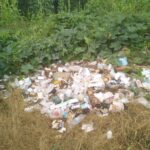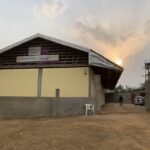Waste Incinerator for The Bekoko Medical Centre, Cameroon
About the Project

Project description
Healthcare centers play a crucial role in ensuring human well-being and survival by providing safe and sanitary environments for treatment and recovery. When these facilities themselves are unable to maintain hygiene and properly manage waste, the risk of infections and environmental harm increases significantly.
The Bekoko Medical Center in Cameroon (serving around 200 patients per month with 14 patient beds), along with many other healthcare facilities in its vicinity, is facing an urgent crisis due to the lack of a sustainable solution for disposing of infectious medical waste. The center generates hazardous waste such as used syringes, contaminated dressings, and biological materials. Previously, waste disposal was handled by a local company, but their services were infrequent, causing waste to accumulate. The situation worsened when the company shut down entirely, leaving the medical center—and many others in nearby areas—without any means of safe waste disposal.
This issue has reached a critical point, with infectious waste piling up at the medical center, threatening the safety of both patients and healthcare workers. The absence of a proper disposal system significantly increases the risk of cross-infection and compromises the basic hygiene necessary for effective medical care. Additionally, the uncontrolled accumulation of infectious waste is causing severe environmental pollution, contaminating the surrounding soil and flora. The problem is not isolated—hospitals in surrounding villages are also struggling with the same challenge, making this an escalating health and environmental crisis.
To address this, we urgently plan to build a waste incinerator at The Bekoko Medical Center that will safely burn the infectious waste produced by the center. This incinerator will also serve other hospitals in the area, allowing waste to be collected from these facilities and brought to the incinerator for safe disposal.
This project will help prevent further environmental degradation, protect patients and staff, and create a lasting framework for responsible waste management. Your support will not only ensure that infectious waste is managed safely but will also raise awareness about the importance of sustainable waste management.
What will we do?
1. Build an incinerator to safely dispose of infectious medical waste.
2. Conduct workshop to train employees on the proper use and maintenance of the incinerator to ensure sustainability.
3. Evaluate existing waste separation practices to identify gaps and improve processes.
Who are we?
We are from Technology without Borders. Our working group (Waste Management) has been involved in providing sustainable waste management solutions in developing countries.
Visit our website for more details.
If you have further inquiries, please contact: ed.goet@lerahk.vahbmas
The Bekoko Medical Center in Cameroon (serving around 200 patients per month with 14 patient beds), along with many other healthcare facilities in its vicinity, is facing an urgent crisis due to the lack of a sustainable solution for disposing of infectious medical waste. The center generates hazardous waste such as used syringes, contaminated dressings, and biological materials. Previously, waste disposal was handled by a local company, but their services were infrequent, causing waste to accumulate. The situation worsened when the company shut down entirely, leaving the medical center—and many others in nearby areas—without any means of safe waste disposal.
This issue has reached a critical point, with infectious waste piling up at the medical center, threatening the safety of both patients and healthcare workers. The absence of a proper disposal system significantly increases the risk of cross-infection and compromises the basic hygiene necessary for effective medical care. Additionally, the uncontrolled accumulation of infectious waste is causing severe environmental pollution, contaminating the surrounding soil and flora. The problem is not isolated—hospitals in surrounding villages are also struggling with the same challenge, making this an escalating health and environmental crisis.
To address this, we urgently plan to build a waste incinerator at The Bekoko Medical Center that will safely burn the infectious waste produced by the center. This incinerator will also serve other hospitals in the area, allowing waste to be collected from these facilities and brought to the incinerator for safe disposal.
This project will help prevent further environmental degradation, protect patients and staff, and create a lasting framework for responsible waste management. Your support will not only ensure that infectious waste is managed safely but will also raise awareness about the importance of sustainable waste management.
What will we do?
1. Build an incinerator to safely dispose of infectious medical waste.
2. Conduct workshop to train employees on the proper use and maintenance of the incinerator to ensure sustainability.
3. Evaluate existing waste separation practices to identify gaps and improve processes.
Who are we?
We are from Technology without Borders. Our working group (Waste Management) has been involved in providing sustainable waste management solutions in developing countries.
Visit our website for more details.
If you have further inquiries, please contact: ed.goet@lerahk.vahbmas
Gallerie


Information
Donation Status
0 % funded
0
donors
0 %
funded
5.000 €
missing
Project number
CMR_12_WM
Project Leader
Sambhav Kharel
Regional Groups
- Erlangen
Project Category
 Waste
Waste Timespan
January 2025 - now
Project stage
current
News
No entries.
